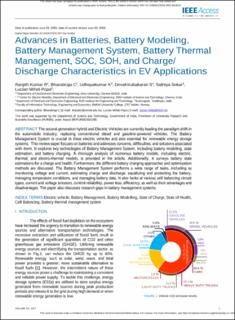| dc.contributor.author | Kumar, Ranjith R. | |
| dc.contributor.author | Bharatiraja, Chokkalingam | |
| dc.contributor.author | Udhayakumar, K. | |
| dc.contributor.author | Devakirubakaran, S. | |
| dc.contributor.author | Sekar, Sathiya K. | |
| dc.contributor.author | Mihet-Popa, Lucian | |
| dc.date.accessioned | 2023-10-16T14:49:05Z | |
| dc.date.available | 2023-10-16T14:49:05Z | |
| dc.date.created | 2023-10-02T12:17:59Z | |
| dc.date.issued | 2023 | |
| dc.identifier.citation | IEEE Access. 2023, 11, 105761-105809. | en_US |
| dc.identifier.issn | 2169-3536 | |
| dc.identifier.uri | https://hdl.handle.net/11250/3096802 | |
| dc.description.abstract | The second-generation hybrid and Electric Vehicles are currently leading the paradigm shift in the automobile industry, replacing conventional diesel and gasoline-powered vehicles. The Battery Management System is crucial in these electric vehicles and also essential for renewable energy storage systems. This review paper focuses on batteries and addresses concerns, difficulties, and solutions associated with them. It explores key technologies of Battery Management System, including battery modeling, state estimation, and battery charging. A thorough analysis of numerous battery models, including electric, thermal, and electro-thermal models, is provided in the article. Additionally, it surveys battery state estimations for a charge and health. Furthermore, the different battery charging approaches and optimization methods are discussed. The Battery Management System performs a wide range of tasks, including as monitoring voltage and current, estimating charge and discharge, equalizing and protecting the battery, managing temperature conditions, and managing battery data. It also looks at various cell balancing circuit types, current and voltage stressors, control reliability, power loss, efficiency, as well as their advantages and disadvantages. The paper also discusses research gaps in battery management systems. | en_US |
| dc.language.iso | eng | en_US |
| dc.publisher | IEEE | en_US |
| dc.rights | Attribution-NonCommercial-NoDerivatives 4.0 Internasjonal | * |
| dc.rights.uri | http://creativecommons.org/licenses/by-nc-nd/4.0/deed.no | * |
| dc.subject | electric vehicle | en_US |
| dc.subject | battery management | en_US |
| dc.subject | battery modelling | en_US |
| dc.subject | state of charge | en_US |
| dc.subject | state of health | en_US |
| dc.subject | cell balancing | en_US |
| dc.subject | battery thermal management system | en_US |
| dc.title | Advances in Batteries, Battery Modeling, Battery Management System, Battery Thermal Management, SOC, SOH, and Charge/Discharge Characteristics in EV Applications | en_US |
| dc.type | Peer reviewed | en_US |
| dc.type | Journal article | en_US |
| dc.description.version | publishedVersion | en_US |
| dc.subject.nsi | VDP::Teknologi: 500 | en_US |
| dc.source.pagenumber | 105761-105809 | en_US |
| dc.source.volume | 11 | en_US |
| dc.source.journal | IEEE Access | en_US |
| dc.identifier.doi | 10.1109/ACCESS.2023.3318121 | |
| dc.identifier.cristin | 2180901 | |
| cristin.ispublished | true | |
| cristin.fulltext | original | |
| cristin.qualitycode | 1 | |

